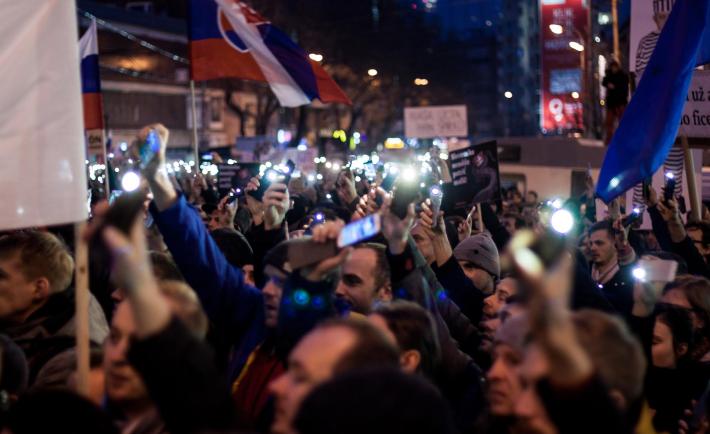In recent weeks, Slovakia has experienced massive protests at a scale unseen since the fall of the communist regime in 1989. The protests have been organized throughout the country by young people in their early 20s, many of whom haven’t been engaged politically before. In fact, many of the youth now protesting were born into democracy and barely remember the fight against the authoritarian regime of the late 90s, let alone life under the Soviet-aligned government that came before it.
The protests we are currently witnessing, initially fueled by the unprecedented murder of investigative journalist Jan Kuciak, have already resulted in the resignation of the minister of interior and, later, of Prime Minister Robert Fico’s cabinet. While the protests triggered the resignations, civic unrest toward Fico’s cabinet already existed due to accusations of corruption and alleged mafia ties to political elites. However, Slovaks are now demanding Za slusne Slovensko – “Decency in Slovakia” – which means politics clean of corruption, mafia connections and attacks on journalists.
Similar youth-led protests have occurred in other countries of the Visegrad region (also known as the V4, and comprised of the Czech Republic, Hungary, Poland and Slovakia). But where does the energy go when the protests finish? Youth research conducted by NDI in Hungary, Poland and Slovakia (ages 16-29) shows that most young people tend to get involved in public life in a “conventional way” – by voting in elections (76 percent in Poland, 53 percent in Slovakia and 67 percent in Hungary).
Despite replacing the old government with an ostensibly new one, the major political parties remain untouched, leaving many to believe the changes will fail to produce the catharsis Slovak politics needs to substantively transform the government. Many of the youth organizers, for example, are not interested in engaging with any of the political parties. One of the protest organizers publicly stated that she doesn’t plan on joining an official party. NDI’s research findings echo her comment: becoming a member of a political party is the least-supported means of political engagement among young people, and is connected with very low trust in political parties. Only 4 percent or less of youth surveyed have been engaged with political parties.
Concrete and transformative change happens within the boundaries of the political system. Political parties will not, and perhaps cannot, offer better governance unless younger generations engage with the parties. NDI works with civic activists, political actors, and parliaments to support democracy renewal and political discourse in Central Europe, including Slovakia. With this support, energy from street protests can be systematically channeled to provide long-term outcomes, first through political party engagement and later through party transformation. Young voters should be empowered to not just mobilize, but also to organize in pursuit of credible representation.

